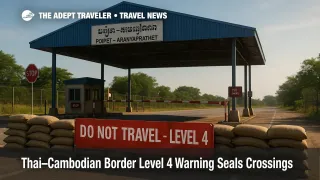Thai-Cambodian Border Level 4 Warning Seals Crossings

The U.S. State Department has elevated the Thai-Cambodian frontier to a Level 4 Do Not Travel zone following artillery duels and air strikes that forced every major land checkpoint to shut. Martial law now blankets eight Thai districts abutting Chanthaburi and Trat, while Cambodia is evacuating Oddar Meanchey and Preah Vihear provinces. Though flights between Bangkok, Phnom Penh, and Siem Reap continue, buses, trains, and visa-run vans are idled, leaving budget travelers marooned at roadblocks. Adept Traveler's earlier coverage of the crisis is [here].
Key Points
- Why it matters: Level 4 status disrupts Southeast Asia's busiest overland backpacker corridor, affecting visas, tours, and cargo.
- Closed checkpoints: Poipet-Aranyaprathet, Chong Chom-O'Smach, Chong Sa-ngam, Chong An Ma, plus all Chanthaburi / Trat gates.
- Safe detours: Fly Bangkok (BKK) ⇄ Phnom Penh (PNH) or Siem Reap; reroute overland via coastal Highway 3 into Malaysia.
- Martial law tools: Thai army now enforces dusk-to-dawn curfews, snap vehicle searches, and no-fly zones for drones.
- Hotlines: U.S. Embassy Bangkok +66-2-205-4000, Phnom Penh +855-23-728-000; Thai Tourist Police 1155; Cambodia Police 117.
Snapshot
Land skirmishes have spread across twelve flashpoints, with rockets hitting villages near the Ta Muen Thom temple and artillery landing inside Surin, Si Sa Ket, and Buriram. Thai authorities sealed rail service at Aranyaprathet and halted Transport Co. buses linking Bangkok to Siem Reap and Phnom Penh. Cambodia redirected domestic flights away from the conflict zone, but international routes remain on schedule after minor path tweaks. Travelers still inside the 30-mile exclusion belt face patchy mobile coverage, military checkpoints, and fuel shortages. Insurance providers are treating the zone as an active-conflict area, voiding most standard policies.
Background
Border friction over temple land flared on July 23 when a land-mine blast wounded five Thai soldiers near Chong An Ma. Reciprocal artillery strikes followed, echoing the 2011 Preah Vihear fighting yet on a broader scale. Thailand quickly recalled its ambassador, closed crossings in six provinces, and collapsed talks on joint tourism zones. Cambodia withdrew embassy staff and called for an unconditional cease-fire. By July 25 Bangkok had imposed martial law on seven Chanthaburi districts plus Trat's Khao Saming, granting the army authority to restrict movement and commandeer transport. Over 168 000 residents on both sides are now in temporary shelters as ASEAN races to broker talks.
Latest Developments
Border Crossings Padlocked
Military orders now bar civilian traffic at every formal gate from Ban Khlong Luek in Sa Kaeo to Hat Lek in Trat. Informal footpaths are also patrolled, and Thailand's Burapha Task Force warns that trespassers risk arrest under martial-law statutes. Cambodian traders who rely on the Poipet dry-port are rerouting cargo through Sihanoukville, adding two days' transit and raising logistics costs.
Transport Disruptions Multiply
State-run Transport Co. and private coach firms have suspended all Bangkok-Cambodia buses, while the State Railway of Thailand halted eastern-line trains at Kabin Buri, 90 miles short of the frontier. The Civil Aviation Authority of Thailand confirms that four carriers-Thai Airways, Bangkok Airways, Thai AirAsia, and Thai Vietjet-still operate 100-plus weekly seats to Cambodia, albeit on revised tracks that skirt restricted airspace. Travelers should allow extra time at Suvarnabhumi for manual security checks of Cambodia-bound baggage.
Martial Law's Travel Impact
Curfews run 10 p.m.-4 a.m. in affected Thai districts, and foreign travelers must carry passports at all times. Drone photography near military sites is banned, and reporters need advance clearance. Thai hospitals in the border belt have diverted patients inland; travelers seeking routine care may be sent to Bangkok or Pattaya. Cambodia has declared "administrative military zones" around Oddar Meanchey, limiting inter-provincial buses and closing Angkor-bound Highway 6 at night.
Analysis
The Level 4 designation removes the Thai-Cambodian land corridor from many group itineraries just as mid-summer student travel peaks. Operators are rushing to re-book clients onto Bangkok-Phnom Penh flights, where seat inventory is tightening and fares already show 25 percent surcharges. Trade flows also feel the pinch: the Aranyaprathet-Poipet gateway handles a third of Thailand's fruit exports to Vietnam, and closures force a detour through Laos, adding 300 miles and refrigeration challenges. Martial-law curfews further complicate coach driver scheduling and raise insurer risk premiums. Conversely, destinations far from the frontier-Chiang Mai, Phuket, Angkor Wat, and the Cambodian coast-remain open, and airlines are redirecting marketing spend to highlight these safer zones. The crisis tests ASEAN's ability to quell intra-bloc conflict and will likely shape regional risk-management policies for years.
Final Thoughts
Until a verified cease-fire holds, travelers should dodge any itinerary that involves ground transport across the frontier. Keep embassy numbers handy, enroll in STEP or equivalent services, and confirm that your policy covers wartime evacuations. With curfews, closed checkpoints, and fluid flight schedules, flexibility and real-time updates are vital when navigating the Thai-Cambodian border clashes.
Sources
- Thailand Travel Advisory - U.S. State Department
- International Travel Information: Thailand - U.S. State Department
- What We Know About Clashes - Al Jazeera
- Martial Law in Border Districts - DW
- Chanthaburi-Trat Border Closures - The Nation
- Bus Suspension Notice - The Nation
- Rail Service Halt - Bangkok Post
- Flight Operations Advisory - The Nation
- U.S. Embassy Bangkok Emergency Contact - U.S. Embassy Bangkok
- U.S. Embassy Phnom Penh Emergency Contact - U.S. Embassy Phnom Penh
- Thai Tourist Police Hotline 1155 - Tourist Police
- Cambodia Emergency Numbers - Asia Top Travel
